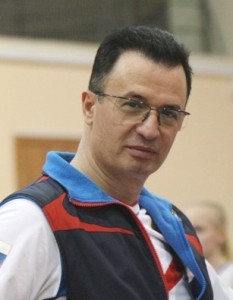-
Share this post
Tips for Safety in Artistic Gymnastics (Part 1)
Sergei Zelikson is an honoured artistic gymnastics coach in Russia and a personal coach of Anastasia Grishina.
 The autumn has come – the time when a lot of parents are preparing to take their child to school for the first time and some are enrolling their children in the sports. Many will choose or already have their children going to gymnastics centers. Whoever you are, it will be useful to learn and consider a few tips for safety in Artistic Gymnastics.
The autumn has come – the time when a lot of parents are preparing to take their child to school for the first time and some are enrolling their children in the sports. Many will choose or already have their children going to gymnastics centers. Whoever you are, it will be useful to learn and consider a few tips for safety in Artistic Gymnastics.
Artistic Gymnastics is a kind of sports where coordination and motor skills are factors to good athletic performance and success in gymnastics. Moreover, it’s an Olympic event, meaning that an Olympic Gymnast must perform a highly complex set of movements and elements. When combined together elements become a routine which is a high risk to life. There are many thousands wishing to be a champion and only one wins – one who will perform a perfect routine and make no errors.
Children are usually enrolled in a beginner gymnastics class from a young age of 3-5 years old. It happens that quite often parents expect their offspring to become a star athlete well in advance. Sometime during the gymnastics career it happens that the dreams of parents damage their child’s psyche in terms of the balanced development which makes a child behave anxiously. As a result a child is afraid of letting parents down (as a rule, it’s a mother), of making a mistake during the training and even of practicing elements. In this respect coaches don’t always have adequate time to part these parents from inadequate expectations and their children from inner anxiety. Sometimes the coach himself can set a goal too high for a young gymnast, without properly assessing gymnast’s abilities, thereby further increasing the feeling of fear that a child has. In gymnastics, it is normal to be only left with 1-3 out of 10 newcomers who are fit for such a hard discipline.
To comply with tough gymnastics requirements, these young athletes must have a high degree of coordination, strength, flexibility and agility that will allow them to make their long way through the sport safely and learn elements on a progressive scale. However this only applies to a big sport. As a way of achieving optimum health, gymnastics will suit absolutely everyone. On the other hand, a lot of coaches are looking for the shortest way to the Olympic arena. They wrongly think that their enthusiasm and a high load of gym work will ensure their gymnasts become a star athlete in no time. Unfortunately it is not a key to success if the kid simply lacks certain abilities. As a gymnast you need to have great coordination ability. It’s just like in music – even you one memorize all the notes, you still won’t become a musical genius unless you have a good ear for music.
Good flexibility and power skills will simply not be enough to compensate for the lack of coordination and orientation. This type of gymnast will push off the beam very strongly but will fail to land correctly and end up with a big bruise on the leg. When performing a dismount off the uneven bars one can easily become disoriented and hit the legs against the bar; and even when executing a simple pirouette one can lose a reference point and make two twists instead of one without realizing what happened. As a consequence the gymnast starts having mental blocks and fear becomes an unwelcome obstruction to a learning process.
Why injuries in gymnastics are an unavoidable aspect of the sport?
There are many factors at different stages that affect this. The most important is for parents to understand their child’s true abilities before he or she can start doing gymnastics. It is quite simple at the initial stage. That is because almost all gym clubs have a trampoline which is the best tool for testing and determining the coordination and special awareness abilities. If a child is bravely jumping high and full of joy, then you can certainly tell that you have done the right choice. Generally speaking these gifted children can start doing gymnastics at any age.